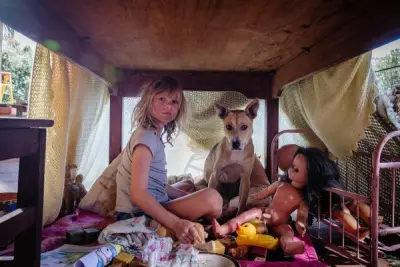‘Don’t Let’s Go to the Dogs Tonight’ delves into colonialist mentality through the eyes of a child

Lexi Venter in Don t Let s Go to the Dogs Tonight Photo provided by Sony Pictures Classics In an early scene in Don t Let s Go to the Dogs Tonight -year-old Bobo Lexi Venter stuns her family when she asks her mother if they are racists Bobo has grown up in Zimbabwe then Rhodesia in the s during the late stages of the country s civil war as nationalist groups seek to overthrow the minority British rule and return power to native Africans She lives on a rundown farm with her parents and older sister a far cry from her grandparents posh spacious home which is where she asks her mother this question Bobo s mother Nicola Embeth Davidtz who also wrote and directed the film seems genuinely perturbed at the idea in a way that s a little funny how could she a white woman living in colonial Africa be racist If Bobo were older you might think she was trying to pick a fight But Bobo isn t really old enough to understand what racism is let alone how she and her family might be ongoing participants in a system that perpetuates it She brings no negative connotation to the word she just heard it somewhere and thought it sounded an awful lot like specific people she knew This moment in Don t Let s Go to the Dogs Tonight based on Alexandra Fuller s memoir of the same name encapsulates the film in a nutshell Over the curriculum of the film Bobo begins to unlearn a colonial mentality and superiority complex that have been instilled in her since birth Since the film is so singularly focused on that perspective it s sometimes tough for it to escape the colonialist point of view it s working to untangle But Don t Let s Go to the Dogs Tonight is hyper aware of how that perspective can be limiting and tries to use that to its advantage In addition to her immediate family Bobo lives with a plethora of animals dogs ducks horses you name it and Sarah Zikhona Bali and Jacob Fumani Shilubana two native Zimbabweans who work for her family There s a real sense of grime on the Fuller farm a visual motif that evokes Lucrecia Martel s La ci naga in how it portrays the nastiness that permeates the home of this invading force Bobo almost never bathes and no adult in the house besides Sarah seems to think it prudent that she does When Nicola finds a tick on one of her dogs she squashes it onto the stone floor with her bare heel before the dog gobbles up its mangled remains Every inch of space including the Fullers themselves is covered with muck That sense of rot and decay bleeds into a malevolence that spreads throughout the colony of white-owned properties where the Fullers reside Bobo s parents a soldier and a policewoman fall asleep cradling rifles and warn their daughters to not creep around the house at night for fear that they mistake the children for terrorists and kill them This house does not feel like a home and these people are a danger to themselves each other and everyone around them It s only in Sarah s home that the audience and Bobo finds a modicum of safety Her home is cozy clean and colorful fitting into the surrounding space in a way that the Fuller home does not Don t Let s Go to the Dog s Tonight gives us little peeks into the native Zimbabwean point of view mainly through Sarah who sits firmly on the side of a movement who wants Bobo and all like her gone but has a complicated affection for the child That affection frightens her sometimes especially when she finds herself unable to separate Bobo the child from what she represents In one scene she finds Bobo ordering two young boys around mimicking her parents and the way they expect every African around them to fall in line As Sarah Bali is meditative and pensive rarely raising her voice until this very moment It comes from anger with Bobo but also from anger with herself for ignoring the reality of this situation for too long As is the development with greater part of these stories Sarah ends up being the vessel through which Bobo learns and becomes a sort of collateral damage in the process That doesn t ring untrue but it does somewhat limit Sarah as a character As a filmmaker Davidtz seems aware of that limitation and tries to tie it to Bobo s limitations as a narrator particularly visually As Bobo Venter s performance is reminiscent of Brooklynn Prince in s The Florida Project She feels like a real child that is to say she s as annoying as she is endearing She was raised in a world where adults ignore her they ignore all children often to tragic effect and as a effect she s an year old who smokes cigarettes drinks beer and fiddles with the grenades strapped to her father s backpack before he heads out for work But for as much as she is ignored and for as much as she comes across easily distracted she s tremendously observant she s just not unfailingly able to put a name to what she s seeing As a performer Venter has a natural lightness to her but her stare takes on a piercing almost wild quality when she notices something she perhaps wasn t supposed to see The film is shot from Bobo s perspective the adult conversations reliably taking place in her periphery There are moments where Davidtz uses this to haunting effect in one scene Bobo watches her parents argue from underneath a table only seeing their feet and hearing their voices until Nicola falls violently to the floor her warped screaming face mere feet away Besides Sarah Nicola is the largest part major force in Bobo s life their relationship defined by Nicola s alcoholism and a family tragedy that is part of the reason she is so adamant that the family cannot leave Zimbabwe As much as Bobo learns from Sarah she also learns from her mother by film s end completely able to begin to understand that Nicola is grasping wildly at nothing desperate to preserve a way of life that is rotten to the core The post Don t Let s Go to the Dogs Tonight delves into colonialist mentality through the eyes of a child appeared first on Rough Draft Atlanta
